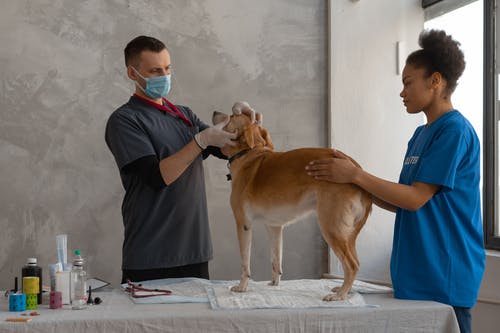
Common Internal Medicine Conditions in Pets: Causes, Symptoms, and Treatment
July 11, 2023Common Internal Medicine Conditions in Pets: Causes, Symptoms, and Treatment
Have you ever noticed your pet acting differently or showing signs of discomfort? As a pet owner, it’s essential to recognize that sometimes these signs can indicate an internal medicine issue. This article discusses some of pets’ most common internal medicine conditions, their causes, symptoms, and available treatments. So let’s get started and discover more about the well-being of our beloved buddies!
Gastrointestinal Disorders
Gastrointestinal disorders are one of the most common issues in pets, affecting their stomach and intestines. Some common causes include eating human food, food allergies, infections, or lack of digestive enzymes. Gastrointestinal disorders can manifest themselves in many ways, including:
- Changes in appetite
- Changes in stool quantity or quality
- Regurgitation or vomiting
- Weight loss
- Abdominal pain
- Lethargy
- Fever
Treatment for gastrointestinal disorders will vary depending on the cause and symptoms, but it may include a change in diet, medication, or surgery.
Hepatic Diseases
Hepatic diseases can affect the liver, responsible for digestion, blood clotting, and removing toxins from the body. Causes of hepatic diseases can range from aging, genetics, infections, trauma, medications, diabetes, fatty foods, or even untreated heartworms. Clinical signs of liver issues can be subtle and may include:
- Weight loss
- Loss of appetite
- Vomiting and diarrhea
- Increased thirst
- Unstable walking
- Increased need to urinate
- Confusion
- Yellowish eyes, tongue, and gums (jaundice)
Treatment for hepatic diseases depends on the underlying cause and severity of the condition. This can range from medication to managing the condition through diet and lifestyle changes.
Renal Disease
Renal or kidney disease occurs when the kidneys fail to function correctly. Some common causes are infections, kidney stones, blockages, genetics, or cancer. Kidney disease can lead to symptoms such as:
- Dehydration
- Lethargy
- Loss of appetite
- Drinking more water
- Increased urination
- Vomiting
- Weight loss
- Bad breath with a chemical odor
The goal of renal illness treatment for pets is to control the symptoms and reduce the disease’s development. Medication, hydration treatment, and dietary changes could all be part of this.
Urogenital Disease
Urogenital diseases can encompass multiple issues of varying severity. Examples of common urogenital diseases in pets include:
- Urinary Tract Infection
- Kidney Infection
- Kidney Stones / Bladder Stones
- Diabetes
- Cushing’s Disease
- Prostate Gland Disease
- Incontinence
Treatment for these conditions depends on the specific disease and its severity. Options may range from medication to surgery, depending on the issue.
Vascular Disease
Vascular diseases can affect pets’ arteries, veins, and lymph vessels. An example of a common acquired vascular disease requiring internal medicine treatment is Rocky Mountain Spotted Fever, caused by tick bites. This condition can be treated with antibiotics.
Pulmonary Disease
Chronic Obstructive Pulmonary Disease (kittens are also susceptible to internal medicine conditions). Since their immune systems are still developing, youngsters might be more vulnerable to infections and other problems. During this period of growth, it is essential to have regular checkups since early detection might result in better results. Establishing a solid relationship with a reputable veterinarian, like Skyline Animal Clinic, can help ensure your young pets receive the best care and guidance for a healthy future.
Puppies and Kittens
Puppies and kittens are also susceptible to various internal medicine conditions. Their immune systems are still developing, so they may be more prone to infections and other issues. Regular checkups are crucial during this developmental stage, as early detection can lead to better outcomes. Establishing a solid relationship with a reputable veterinarian can help ensure your young pets receive the best care and guidance for a healthy future. Click here to learn more.
Conclusion
In conclusion, awareness of common internal medicine conditions in pets and recognizing their symptoms can contribute to early detection and successful treatment. As a pet owner, it’s crucial to maintain a proactive approach to your pet’s health through routine exams, preventive pet care, and keeping an open dialogue with your veterinarian about any concerns. By staying informed about these conditions and working with a qualified veterinary professional, you can ensure your pet enjoys a healthy and happy life.




